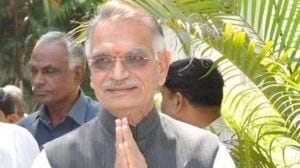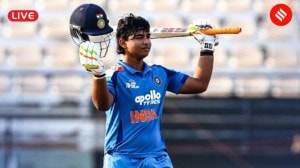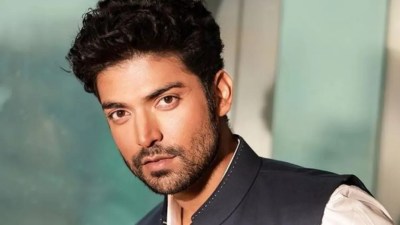Somak Raychaudhury at Idea Exchange: ‘The template we have… go to university at 18, stop learning at 21, stay with it all your life — that can’t happen now’
Somak Raychaudhury is one of India’s best-known astrophysicists. He was the director of Inter-University Centre for Astronomy and Astrophysics, Pune, before being appointed as Vice- Chancellor of Ashoka University.
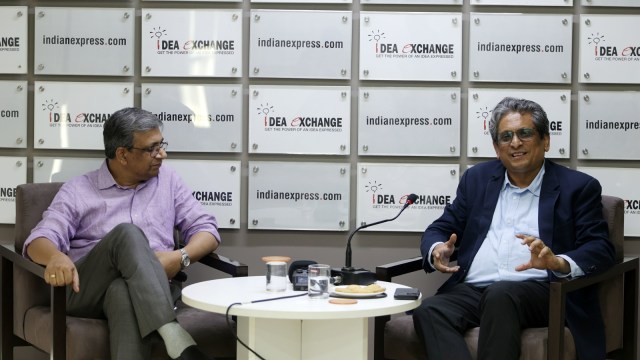 Somak Raychaudhury, Vice Chancellor, Ashoka University (right) in conversation with Amitabh Sinha, Deputy Editor, The Indian Express. (Express photo by Gajendra Yadav)
Somak Raychaudhury, Vice Chancellor, Ashoka University (right) in conversation with Amitabh Sinha, Deputy Editor, The Indian Express. (Express photo by Gajendra Yadav)Somak Raychaudhury, Vice-Chancellor, Ashoka University on the synergy between science and liberal arts, need for universities to priortise research and politics on campus. The conversation was moderated by Amitabh Sinha, Deputy Editor, The Indian Express
Amitabh Sinha: One of the reasons you were brought to Ashoka University was to set up science faculties. Ashoka is probably the first example of a liberal arts university setting up strong science departments. Is this the way to go for other institutions as well?
Before Ashoka, I worked at general universities that do sciences and humanities and then I was associated with a specialised astrophysics research institute. I’ve seen both the worlds. In education, particularly at the undergraduate level, divisions between subjects are very artificial, especially in a world now where subject-based teaching is becoming extinct. If you think of what Nalanda taught in the seventh-eighth centuries or even what Newton was taught at Cambridge in the 17th century, there were no divisions between subjects. Everybody had to learn some basic subjects — astronomy, law, literature, religion, mathematics. Divisions were essentially made in the middle of the 19th century, in places like Oxford and Cambridge. The purpose was to train people for certain specialised jobs. Right now, education has to completely change itself and focus on skills, on how to process information. In that, trying to separate out sciences from the humanities and social sciences doesn’t make sense. People are understanding issues rather than subjects. They’re looking at how people who deal with knowledge come from different angles to deal with issues. This is where liberal arts education, if it concentrates only on social sciences, misses out on ways of dealing with knowledge. That’s why sciences are important. It is also about bringing in science as a method to analyse information.
Amitabh Sinha: One of the recent government interventions is to re-introduce R&D in the universities. Ashoka has already done that quite successfully. Is that a model that can be replicated in state universities as well?
It is essential. Worldwide, outside India, most of the research happens in universities. Nobel Prize winners come from universities. In India, because of a complex set of reasons, research was separated from the university system. The thought was that because there were very few researchers in independent India, they needed to be protected from students and provided institutions that do only research. Worldwide, it is very rare to find such institutions. Famous research institutions abroad, like Fermilab or NASA’s JPL, all work with universities, even though they are research institutions. In India, they are totally separated. I am talking about educating students to think originally, to solve problems, to discern between what is good information and bad information — that kind of stuff at that level is very difficult. Education is no longer textbook-based. It will not be. That is where the university setup of the West, which is both research and teaching together, actually wins. We have to transform our system.
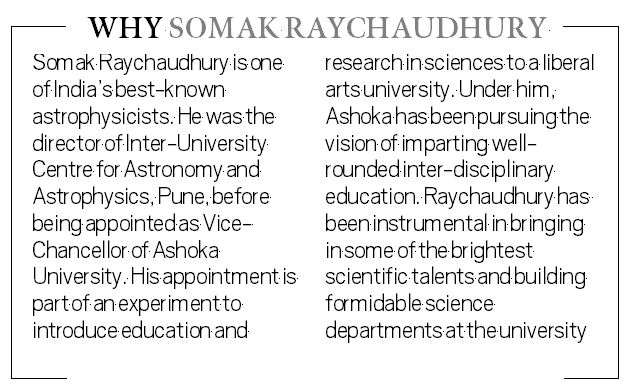
Amitabh Sinha: A lot of university campuses have become highly politicised. Is it good for the university to let students organise themselves on political issues?
A university has many stakeholders — the faculty, the staff, the management, and the students. All of them will have something to say. One part of the university cannot essentially force the other parts to behave in pre-determined ways. There might be some parts of the university administration that have to be confidential, but students should have a say. It depends on how the students organise themselves and how they, with the management, express their views and represent their views.
On Academic Freedom | Academic freedom also means that people are free to express their opinion within reasonable limits of some rules that are laid down so that you don’t offend each other or be violent
Story continues below this ad
Amitabh Sinha: No Indian has won a science Nobel in the last 94 years. Even China, South Korea and Israel, who invest heavily into research, don’t seem to have done much better. What does India need to do differently?
I don’t think the Nobel Prize is representative of the research and development status of a country. To get a Nobel Prize doesn’t necessarily mean that you are the best researcher in a subject or in your country. Rabindranath Tagore got the Nobel in Literature when he did because he had attracted the attention of people in the western world who had highlighted his contribution. Whatever science happens in India happens away from the mainstream. It’s the same in China and South Korea. We are not in the mainstream in the European or American perception. That’s one big factor. When CV Raman won the Nobel, there were people like SN Bose and MN Saha who equally deserved the Prize. Just before that there was JC Bose and Upendranath Brahmachari, who did really pioneering work in medicine. Then you see people come in from the same stable and go through the same kind of undergraduate education in India and Pakistan who’ve got Nobel Prizes working in the West. It’s not just a question of funding. Our pool is very small and that is because research does not happen in universities. People who are being groomed to make these world-changing discoveries come from a small cohort, who don’t have elaborate connections with people in the West whose perceptions can swing the selections. This needs to be changed. If an Indian university system can inspire students and convince them that there is this ecosystem in the country that will allow them to do this work, they won’t go abroad, or at least some will come back and engage with the system here.
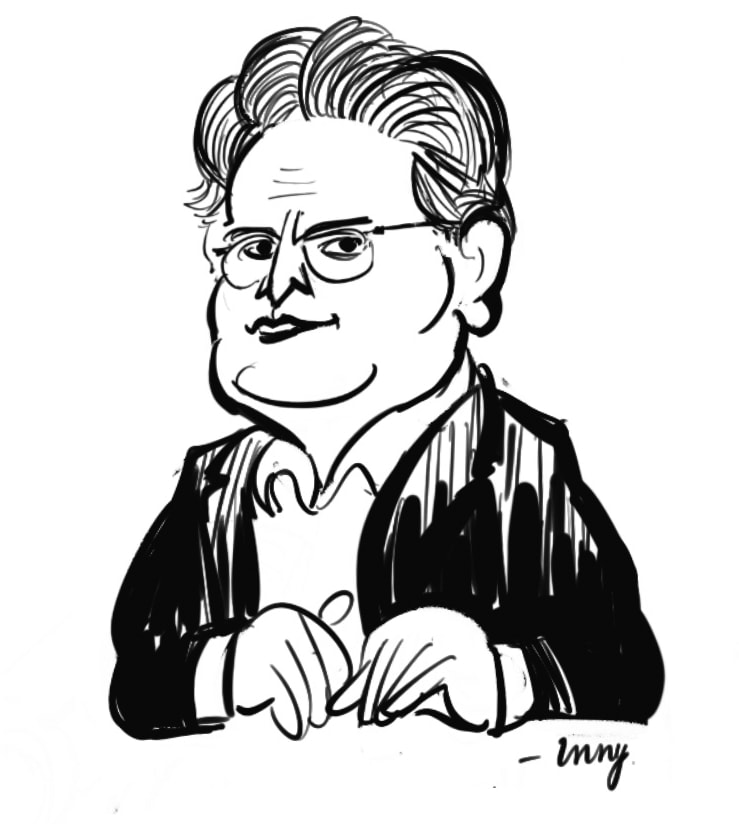
Vikas Pathak: Maybe research facilities are better abroad in science. But isn’t it a problem when research in history, sociology, and politics, starts happening in South Asian departments abroad? Aren’t we building a kind of a colonial relation all over again, where the raw material would go from here and the finished product would come back from there.
In the world’s greatest universities, people in South Asian studies are sitting there because their research environment or ecosystem is wonderful and they find themselves to be supported there. The colonial analogy is not completely fair because the people who work in these departments have to do their fieldwork in India. They gather their data in India, then they go back and do their analysis or writing in these departments. Also, the inter-disciplinary nature is in the systems there. We lack that.
On polarisation in universities | As the world gets more polarised, it’s important for the university to stay as neutral as possible. Universities will absolutely have to reflect what’s happening, but they cannot take sides
Story continues below this ad
Shubhajit Roy: In the current education system, the emphasis is on high scoring. In the examination system, it is on MCQs. There is very little scope for analysis. Is that a challenge?
It’s a huge challenge. Large exams like JEE or NEET involve multiple choice questions for practical reasons. When you come to universities, writing is a core skill that is expected. People often think that if you do sciences, you don’t need to write. That’s not true. In the 21st century, we need problem-solving skills at all levels, not just in social sciences and humanities. We need writing skills, comprehension skills, critical skills. The schools don’t prepare the students for this. There are certain boards like the IB. They have courses to do this. In our core school board system, we don’t encourage critical thinking. Writing has to be underlying every process of education.
 Somak Raychaudhury, Vice Chancellor, Ashoka University. (Express photo by Gajendra Yadav)
Somak Raychaudhury, Vice Chancellor, Ashoka University. (Express photo by Gajendra Yadav)
Kaushik Das Gupta: Critical thinking happens not just in classrooms, but also in the milieu that the university provides to the students, where they engage in what is happening in the world. Does being a private university offer an advantage in this regard?
A private university in India is private only up to an extent. It is private in the way it collects money from philanthropists. It has a lot of flexibility in its processes. But a private university is regulated in India in its academic ambit by the UGC (University Grants Commission). Every course start has to be approved by the state government. We are on government land, acquired from the government on long-term lease, our processes are approved by the government. The independence comes in things that all universities have, which is to do with the kind of freedom that you should have in a university campus. Academic freedom also means that people are free to express their opinion within reasonable limits of some rules so that you don’t offend each other or be violent. But they can express their opinion on the campus. If I have the right to express an opinion, I also have to be mindful of other’s rights. People running a university have to make sure that they balance different stakeholders and opinions.
On need for transformation in our education system | Education is no longer textbook-based. That is where the university setup of the West — both research and teaching — actually wins. We have to transform our system
Story continues below this ad
Aakash Joshi: Social science research is affected by politics. But lately, in hard sciences, in IITs, there are departments of research that one would consider more in the realm of belief. How do you see that playing out in the sciences where there is politics, and research is being conducted at public universities?
Science has always been political. It has been used as a tool of diplomacy between nations. During the Cold War, scientists from the USSR and the US were working together across subjects everywhere, even during the time when direct communication between the two communities was not allowed. I do not believe that the social sciences can be singled out to say that they are more vulnerable to political disagreement or agreements. Science policy is something that is not as well developed as an academic subject as public policy and economic policy is. I do not think anybody pretends that scientists will be away from the religious polarisation that happens in the country.
 Somak Raychaudhury, Vice Chancellor, Ashoka University. (Express photo by Gajendra Yadav)
Somak Raychaudhury, Vice Chancellor, Ashoka University. (Express photo by Gajendra Yadav)
Shubhajit Roy: You talked about collaboration between scientists from hostile countries. Is there an example of Indian and Chinese scientists working in astrophysics?
Many of them have been affected by the tension between the countries and many have not. The 30-metre telescope, the biggest telescope that we are working on, will be built in Hawaii and the five countries that are in charge are China (10 per cent), India (10 per cent), Canada (20 per cent), Japan (20 per cent), rest the US. And we work together. In order to build together, we have to share resources. So, two largest systems in the world — one in China and one in India — there’s a huge amount of collaboration. I have my colleagues going to China to work with the radio telescope there. We work online. As long as it is clear of issues that can run into political problems, technology transfer and technology discussions happen. The entire basis of our understanding of the universe, of inflation, of Big Bang, of cosmology, was developed by Russians and Americans in the ’70s and ’80s at the height of the Cold War. And they didn’t have Zoom then.
Shalini Langer: How much of the writing that the children are now doing is AI-inspired. How much of a concern is that for you? Because if there is so much writing, how do you check that?
In the last year or two, we’ve been inordinately afraid of AI and ChatGPT. AI is also a label on things that we used to do anyway. We used to go to Google and search for things and put things together from Wikipedia. But we as teachers have always been very good at spotting what’s genuine. So it’s very difficult to fool us and there are severe penalties for it. We’ve also changed our nature of assessments. We’ve changed our assessments often to sit-down exams. If we can frame our questions very nicely, then we can beat that. Some of our faculty have turned it around to students and asked them to use ChatGPT. And because there are ways of using ChatGPT which are cleverer than others, let’s test people to do that. I think our answer is to welcome ChatGPT into our family. It’s going to stay with us. Our approach would be to prepare them. Within a short period of time, we’ll know how to deal with it.
 Somak Raychaudhury, Vice Chancellor, Ashoka University. (Express photo by Gajendra Yadav)
Somak Raychaudhury, Vice Chancellor, Ashoka University. (Express photo by Gajendra Yadav)
Vandita Mishra: One of the problems that universities across the world, not just in India, now deal with is the political polarisation, which is rising everywhere. Do you think there are courses that need to be altered, or pedagogical methods that need to be changed, to deal with this?
As the world gets more polarised, it’s important for the university as a system to stay as neutral as possible. This is a challenge. Our approach has always been to make the underlying university as neutral as possible a space, and then let the polarisation play out amongst the stakeholders in an organic way, reflecting what’s happening in the world. Universities will absolutely have to reflect what’s happening in the world, but the university cannot take sides.
Raj Kamal Jha: Many seceded from the government school system given the private English-medium school. At Ashoka, the fee is, on average, Rs 1 lakh a month. Given 200 million kids under the age of 18, where does this go? Do you see 50 Ashokas? Or, a process where Ashoka becomes more inclusive, brings in SC/ST, OBC reservation? As a leader of a university in this fraught time, what’s your long view of this?
I believe education has to be more skill-based and subject-based rather than silos that we defined as subjects… People need to see the connections between different areas of knowledge and also try to develop the skills to cope with them… This template that we have: go to university at the age of 18 and then stop learning at the age of 21, and then stay with it all your life — that can’t happen now. We have to update our knowledge every few years because things are changing very fast. That is what the country needs to move towards. How is it going to do it? I would like 100 Ashokas around the country in terms of the kind of education. Let them see at the university level what subjects look like, rather than pre-conceived notions from schools where they haven’t really got a flavour of what economics is, or what mathematics is, and then choose. If we can do that, we are going to lead the world in the fraction of the young population. Then we can have a trained young population…I’d reverse the order in which I would like 500 Ashokas around the country, in its essence. How you implement that is a different question. If state universities are willing to accept this template and fund universities and colleges like this… the National Education Plan has a basis for it. Even though it has lots of problems, it has the basic idea. Then, the phase of the university does not need to be what you’re talking about. That is one way of doing it.
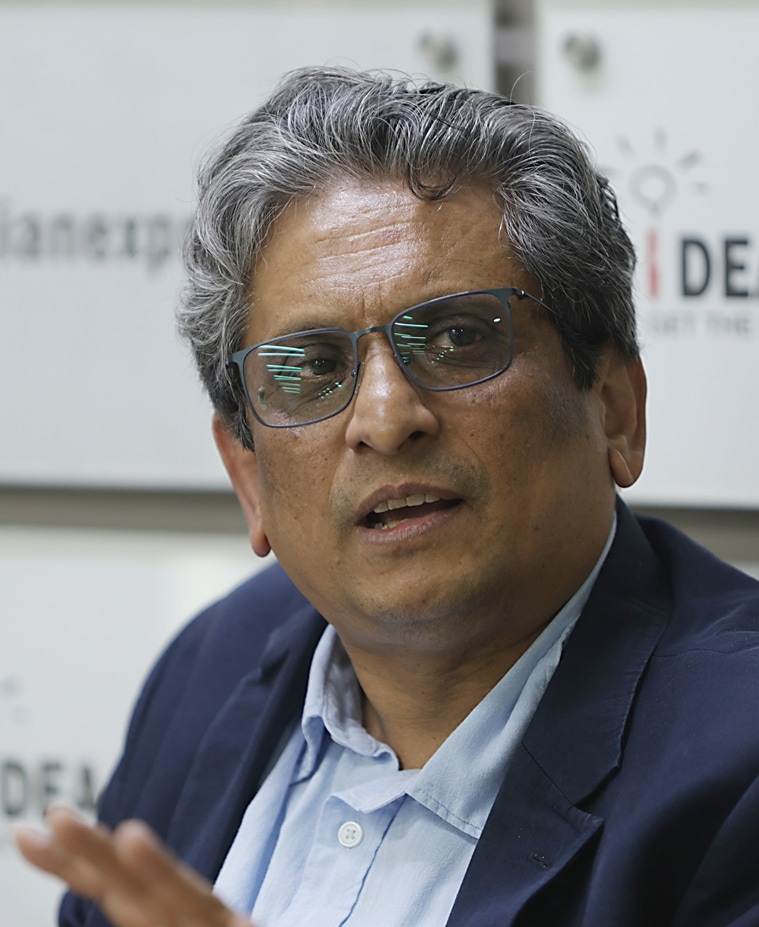 Somak Raychaudhury, Vice Chancellor, Ashoka University. (Express photo by Gajendra Yadav)
Somak Raychaudhury, Vice Chancellor, Ashoka University. (Express photo by Gajendra Yadav)
Diversity of students is important. When I went to university, I learned more from my peers than from my teachers. The ecosystem is important, and also the attitude is important. The attitude you get partly from your faculty, partly from your friends. And whether you’re enjoying university life also depends on that. Right now it is only possible in liberal arts education…We have to charge the fees because we have to run a university in which we have to get the best people together. We are in the mission of building what we think will be India’s best university and one of the top in the world. We have to be as independent of the government as possible. You can’t be totally independent of the government. Then we have to charge these fees. But the way we cope with it is by saying only 50 per cent of the students will pay these fees and they will kind of subsidise the other 50 per cent who are coming from diverse backgrounds and a large fraction of them are not paying any fees at all.


